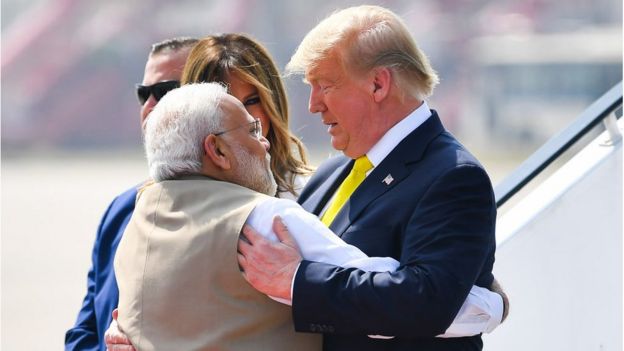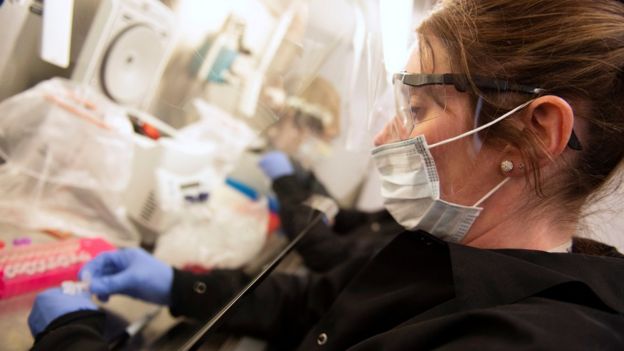
India is reportedly "considering" a request by Donald Trump to release stocks of a drug the US president has called a "game-changer" in the fight against Covid-19.
Mr Trump called India's Prime Minister Narendra Modi on Sunday, a day after the country banned the export of hydroxychloroquine, which it manufactures in large quantities.
The two leaders are on friendly terms, and Mr Trump recently made a high-profile trip to India.
But is India really in a position to help the US? And does hydroxychloroquine even work against the coronavirus?
Hydroxychloroquine is very similar to Chloroquine, one of the oldest and best-known anti-malarial drugs.
But the drug - which can also treat auto-immune diseases like rheumatoid arthritis and lupus - has also attracted attention over the past few decades as a potential antiviral agent.
President Trump said that the US Food and Drug Administration (FDA) had approved it for treating coronavirus, something the organization has denied. Mr Trump later said that it had been approved for "compassionate use" - which means a doctor can give a drug that is yet to be cleared by the government to a patient in a life-threatening condition.
Doctors are able to prescribe chloroquine in these circumstances as it's a registered drug.
Hydroxychloroquine could be bought over the counter and is fairly inexpensive. However, its purchase and use has been severely restricted ever since it was named as a possible treatment for Covid-19.
On Saturday, India banned the export of the drug "without any exception". The order came even as the number of positive cases of Covid-19 spiked in the country. India has now recorded 3,666 active cases of the virus with more than 100 deaths, according to the latest data released by the ministry of health.
But now it seems the government could be reconsidering this stance, possibly following Mr Trump's call to Mr Modi. Local media quoted government sources as saying that a decision on this could be taken as early as Tuesday after considering what domestic requirements could look like in the near future.

Image copyright Getty Images
The two leaders have a warm personal relationship
But does India - one of the world's largest manufacturers of the drug - have the capacity to actually supply other countries as well?
Yes, according to Ashok Kumar Madan, of the Indian Drug Manufacturer's association.
"India definitely has capacity to cater to both global and local markets. Of course, domestic considerations must come first, but we have the capacity," he told the BBC.
Mr Madan also denied reports that China had severely limited the export of the active pharmaceutical ingredient (API) that is used to manufacture hydroxychloroquine. He acknowledged that 70% of all the APIs needed by India to manufacture drugs come from China, but said that supplies from China had steadily continued "by both sea and air".
Many virologists and infectious disease experts have cautioned that the excitement over hydroxychloroquine is premature.
"Chloroquine seems to block the coronavirus in lab studies. There's some anecdotal evidence from doctors saying it has appeared to help," James Gallagher, BBC health correspondent, explained.
But crucially there have been no complete clinical trials which are important to show how the drug behaves in actual patients, although they are under way in China, the US, UK and Spain.
Even so, some are sceptical about how successful they will prove to be.
"If it truly has a dramatic effect on the clinical course of Covid-19 we would already have evidence for that. We don't, which tells us that hydroxychloroquine, if it even works at all, will likely be shown to have modest effects at best," Dr Joyeeta Basu, a senior consultant physician, told the BBC.

Image copyright Reuters
American scientists have begun a trial to see if chloroquine will help treat coronavirus
Raman R Gangakhedkar, a senior scientist with the Indian Council of Medical Research, said the policy at the moment is that the drug is not to be used by everyone.
"It is being given to doctors and contacts of lab confirmed cases. When their data will be complied only then a call can be taken whether it should be recommended to everyone," he told reporters last week.
Despite the fact trials are yet to conclude, people have begun to self-medicate - with sometimes disastrous consequences.
There have been multiple reports in Nigeria of people being poisoned from overdoses after people were reportedly inspired by Mr Trump's enthusiastic endorsement of the drug.
An article in the Lancet medical journal also warns hydroxychloroquine can have dangerous side-effects if the dose is not carefully controlled.
This lack of certainty has prompted social media sites like Facebook and Twitter to delete posts that tout it as a cure - even when they are made by world leaders.